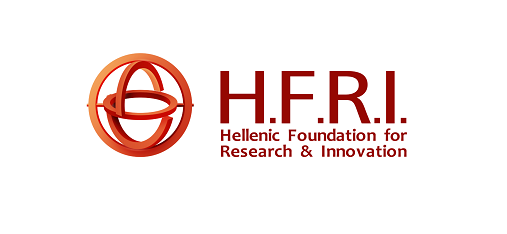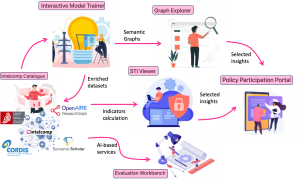
The Hellenic Foundation for Research and Innovation (HFRI) participated as a partner and end-user in the European project IntelComp, funded by the European Union. The objective of IntelComp was to develop a cloud platform that would provide public bodies and policy makers across Europe with AI services for the design and implementation of data and evidence-based policies in the field of Science, Technology and Innovation policy.
As the project reached its completion, check out the following press release on IntelComp’s tools and achievements over the last three years.
IntelComp, the innovation action funded by the Horizon 2020 programme, started in January 2021, to develop a platform for Science, Technology and Innovation (STI) policy-making based on Artificial Intelligence (AI), has successfully come to an end this December. During 3 years, 13 partners (FECYT, TILDE, Hcéres, H.F.R.I., CITE, Technopolis Group, Barcelona Supercomputing Center, Athena Research Center, OpenAIRE, UC3M, SEDIA, ZSI, and NTT DATA) have focused their efforts on developing this platform made up of 6 tools and tested in three specific domains through Living Labs: R&D in AI, STI activities for Sustainable Energy and Agrifood, and Cancer Research.
IntelComp is a platform that analyses large volumes of textual data using Artificial Intelligence (AI) services, improving and automatising tasks to assist Public Administrations in several stages of the STI policy-cycle. It also assists all relevant stakeholders (academia, industry, and citizens) to engage in STI policy-making. It can analyze large volumes and a variety of data about research and innovation activities, and allows to exploit text as data to get insights that previously were not possible.
The main achievements of the project are:
– A theoretical framework that justifies the application of text analysis in STI policy: With the assistance of officials from ministries and funding agencies, the project consortium has defined a framework that combines the functions of the innovation system with the interrelated stages of the policy cycle, focusing on the stages where text analytics can be more useful (Agenda setting or intelligence gathering, policy formulation, policy implementation, and policy monitoring).
– The way to gather the requirements for the platform: With this theoretical framework in mind, the Living Labs of the project have practised with reliable data to define the users’ needs for the different interactive tools.
– Public Administrations have at their disposal a useful and working platform: All the text analysis services and the tools are integrated and deployed. IntelComp tools are sufficiently mature to be applied by ministries and funding agencies to their own use cases of any domain.
IntelComp TOOLS
The IntelComp platform is made up of 6 integrated tools that provide different services exploiting NLP/AI text analysis and are aimed at different target audiences.

STI Viewer
An interactive AI-assisted tool to understand the current STI landscape and visualize its evolution in several domains and countries, observe emerging topics, detect the main players, and learn about the distribution and results of public funding. The target audience of this tool is STI policy analysts who can explore and visualize a comprehensive set of indicators for the agenda setting and the monitoring and evaluation stages of the STI policy cycle.
STI Policy Participation Portal
The STI Policy Participation Portal helps to facilitate the integration of diverse stakeholder input into STI policy-making processes. It offers a user-friendly interface where opinions are collected through surveys enriched with data visualizations from the STI Viewer. This tool fosters a collaborative and transparent policy-making environment ensuring that decisions are not only data-driven but also responsive to societal needs and industry challenges. Academia, Industry, and Citizen representatives are the target audience of this tool.
Graph Explorer
Graph Explorer is an interactive AI-assisted tool to understand the current STI landscape and its evolution, explore thematic communities, and learn about the thematic distribution and evolution of STI funding. The target audience of this tool is STI policy analysts who can explore large graphs of millions of documents for the agenda setting and the monitoring & evaluation stages of the STI policy cycle. It is a very useful tool when you have a large amount of data to analyze and you need insights at aggregated but also granular levels.
Evaluation Workbench
A tool that assists call managers at STI funding agencies in the management of proposals for funding. They can analyze a set of proposals and documents, search for similar documents, automatically classify the proposals, find suitable reviewers, and detect conflicts of interest. Evaluation Workbench makes the evaluation process easier, saving time and increasing efficiency. This tool is intended for public administration officials who manage proposals.
Interactive Model Trainer
This tool is intended for experts in a field. Through a set of interactive services available in the Interactive Model Trainer (IMT), it is possible to incorporate the knowledge of experts in specific domains during model training, thus obtaining higher quality and more interpretable topics. IMT also allows experts to play an active role in the creation and validation of these models. These models then feed the end-users tools (the STI Viewer, the STI Participation Portal, the Graph Explorer, and the Evaluation Workbench). Users can customize their analyses, comparisons, and visualizations according to the new models trained in the IMT.
IntelComp Catalogue
The IntelComp Catalogue offers a single store of data collections to be exploited by the IntelComp tools. It allows the processing of a variety of documents, unifying them and enriching the information to obtain improved and more complete results.
The IntelComp integrated solution is modular and all developed tools are open-source. Moreover, it can be used through two possible scenarios: Users can choose the modules from public software repositories and customize or integrate them in their processes, or through the partners’ professional services around the IntelComp tools (customization, new models, integration, deployment, training or maintenance).
For further information, please visit the IntelComp website.